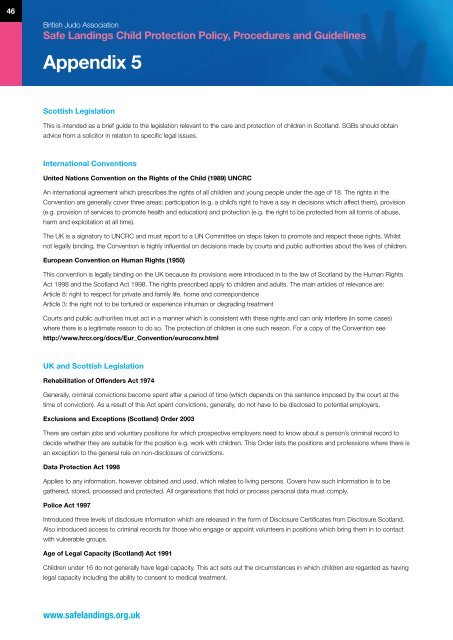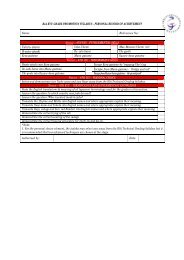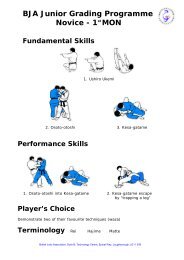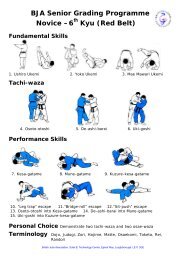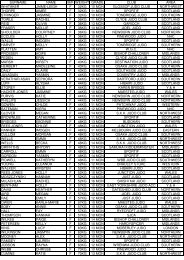Child Protection Policy, Procedures and Guidelines - Judo Scotland
Child Protection Policy, Procedures and Guidelines - Judo Scotland
Child Protection Policy, Procedures and Guidelines - Judo Scotland
Create successful ePaper yourself
Turn your PDF publications into a flip-book with our unique Google optimized e-Paper software.
46<br />
British <strong>Judo</strong> Association<br />
Safe L<strong>and</strong>ings <strong>Child</strong> <strong>Protection</strong> <strong>Policy</strong>, <strong>Procedures</strong> <strong>and</strong> <strong>Guidelines</strong><br />
Appendix 5<br />
Scottish Legislation<br />
This is intended as a brief guide to the legislation relevant to the care <strong>and</strong> protection of children in Scotl<strong>and</strong>. SGBs should obtain<br />
advice from a solicitor in relation to specific legal issues.<br />
International Conventions<br />
United Nations Convention on the Rights of the <strong>Child</strong> (1989) UNCRC<br />
An international agreement which prescribes the rights of all children <strong>and</strong> young people under the age of 18. The rights in the<br />
Convention are generally cover three areas: participation (e.g. a child’s right to have a say in decisions which affect them), provision<br />
(e.g. provision of services to promote health <strong>and</strong> education) <strong>and</strong> protection (e.g. the right to be protected from all forms of abuse,<br />
harm <strong>and</strong> exploitation at all time).<br />
The UK is a signatory to UNCRC <strong>and</strong> must report to a UN Committee on steps taken to promote <strong>and</strong> respect these rights. Whilst<br />
not legally binding, the Convention is highly influential on decisions made by courts <strong>and</strong> public authorities about the lives of children.<br />
European Convention on Human Rights (1950)<br />
This convention is legally binding on the UK because its provisions were introduced in to the law of Scotl<strong>and</strong> by the Human Rights<br />
Act 1998 <strong>and</strong> the Scotl<strong>and</strong> Act 1998. The rights prescribed apply to children <strong>and</strong> adults. The main articles of relevance are:<br />
Article 8: right to respect for private <strong>and</strong> family life, home <strong>and</strong> correspondence<br />
Article 3: the right not to be tortured or experience inhuman or degrading treatment<br />
Courts <strong>and</strong> public authorities must act in a manner which is consistent with these rights <strong>and</strong> can only interfere (in some cases)<br />
where there is a legitimate reason to do so. The protection of children is one such reason. For a copy of the Convention see<br />
http://www.hrcr.org/docs/Eur_Convention/euroconv.html<br />
UK <strong>and</strong> Scottish Legislation<br />
Rehabilitation of Offenders Act 1974<br />
Generally, criminal convictions become spent after a period of time (which depends on the sentence imposed by the court at the<br />
time of conviction). As a result of this Act spent convictions, generally, do not have to be disclosed to potential employers.<br />
Exclusions <strong>and</strong> Exceptions (Scotl<strong>and</strong>) Order 2003<br />
There are certain jobs <strong>and</strong> voluntary positions for which prospective employers need to know about a person’s criminal record to<br />
decide whether they are suitable for the position e.g. work with children. This Order lists the positions <strong>and</strong> professions where there is<br />
an exception to the general rule on non-disclosure of convictions.<br />
Data <strong>Protection</strong> Act 1998<br />
Applies to any information, however obtained <strong>and</strong> used, which relates to living persons. Covers how such information is to be<br />
gathered, stored, processed <strong>and</strong> protected. All organisations that hold or process personal data must comply.<br />
Police Act 1997<br />
Introduced three levels of disclosure information which are released in the form of Disclosure Certificates from Disclosure Scotl<strong>and</strong>.<br />
Also introduced access to criminal records for those who engage or appoint volunteers in positions which bring them in to contact<br />
with vulnerable groups.<br />
Age of Legal Capacity (Scotl<strong>and</strong>) Act 1991<br />
<strong>Child</strong>ren under 16 do not generally have legal capacity. This act sets out the circumstances in which children are regarded as having<br />
legal capacity including the ability to consent to medical treatment.<br />
www.safel<strong>and</strong>ings.org.uk


